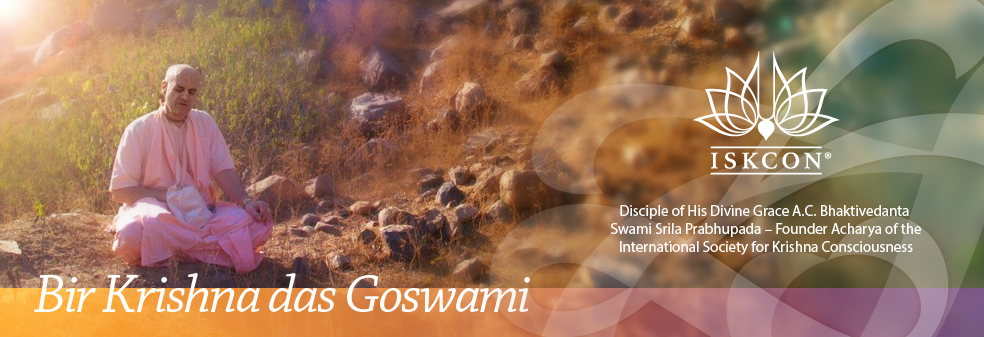May 7, 2007
The names of Krishna are the repository of all happiness. They are the
greatest wealth! If we chant properly, we will not experience material
miseries (spiritual miseries like the feeling of intense separation from
Krishna are another thing!).
So the question arises as to how we can chant nicely, even if we are not yet
pure devotees. How can we control the mind? How can we keep ourselves from
thinking of a million and one things that we have to do or would like to do?
Chanting properly takes practice, but we should approach the practice in a
positive fashion. Instead of thinking: “Now I have to control my mind and not
think of other things,” we should be thinking: “Now I will concentrate on
Krishna’s names which are non-different from Krishna. By concentrating on
Krishna’s names, Krishna will give me all intelligence, and I will love Him
more and more.”
In other words when we approach the holy names in a negative fashion (that
is what we should not be doing) we often think more about what we should not
be doing than what we should be doing. It is often said that “you can’t do a
don’t”!
So, you may ask: “What is your method of chanting and hearing? How can you
stay so focused on Krishna’s names?”
There are basically two different situations where we are chanting; in
kirtana and in Japa, and I approach both differently.
As far as kirtan is concerned, it used to really bug me when the person
chanting could not keep a tune, or was a bad singer, or was arrhythmic
(couldn’t keep a beat). It seemed that I was surrounded by people with these
particular talents! Even I was sent to countries where everyone had those
talents! Then I realized that Krishna had arranged the situation, so I could
fully appreciate His names.
We know that there are two degrees of the stage of ruci (according to the
Madhurya Kadambini). The first degree is when one has a real taste for
kirtan when the person leading is expert in singing and the instruments are
all in tune and played by experts. The second or higher stage is when one
has a real taste for kirtan regardless of the expertise of the persons
leading or accompanying the kirtan (as long as the name is being chanted by
devotees who are following strictly).
In order to encourage devotees to come to the higher stage Srila
Bhaktisiddhanta Sarasvati Thakura sometimes would have the worst singer lead
kirtan!
So, I realized that by the grace of my spiritual master Srila Prabhupada and
my grandfather Srila Bhaktisiddhanta Sarasvati Thakura, I was being pushed
to come to a higher level of appreciating the holy names.
Finally I surrendered, and understood that actually the musical
accompaniment was just the vehicle in which the holy names arrived, and that
I should not be attached to the vehicle. I should be attached to the
passenger (Krishna in the form of His names) in the vehicle. So with
practice I was able to turn off (not hear) the musical accompaniment and
only hear Hare Krishna Hare Krishna, Krishna Krishna Hare Hare, Hare Rama
Hare Rama, Rama Rama Hare Hare!
Then every kirtan became extremely relishable. The holy names are amazing.
You will never get enough of Them. You will pray for millions of tongues and
millions of ears to chant and hear!
My previous attachment to the vehicle was like someone who was attached to
the dinner plate rather than on the prasadam that was on it. Imagine
rejecting tasty prasadam because it was served on a cheap leaf plate rather
than on a silver plate. It doesn’t make sense.
So, when I am attending kirtan, I simply hear the Mahamantra and also think of
the meaning of the Mahamantra: how I am begging Radha and Krishna to situate
me at Their lotus feet, How I am begging Radha and Krishna for Their mercy,
how I am begging Radha and Krishna to give me compassion, etc. Kirtan
becomes an ecstatic prayer session now regardless of the musical
accompaniment.
It is also hard for me to relate when someone says something like: “That was
an ecstatic kirtan,” which indicates some other kirtan wasn’t ecstatic or
that someone thinks they have to travel hundreds or thousands of miles to
experience an “Ecstatic Kirtan.” Ecstatic Kirtans are there for everyone all
the time.
Of course when we are presenting Krishna consciousness to the public it is
important that the music accompaniment be really first class. Also, we
should not force the above understanding on those who are not ready to take
that leap. That is part of preaching strategy which is a whole other
discussion that I will deal with in a future blog.
Now as far as Japa is concerned, what I do is sit with my back straight
(remember Prabhupada’s Japa recording in which he says; “Sit properly”). I
put a pillow under my tucas (sorry I could not think of a better word for it
and if you don’t understand this word ask someone who speaks Yiddish) to
elevate it above the level of the legs. Usually the legs are on the floor.
Then I consciously relax every muscle in my body. I relax my mind and focus
on the sound vibration of Krishna’s names. Also I am conscious of some
specific request I am making of Radha and Krishna as mentioned above in the
kirtan section. The request should be in the mood of emotionally begging
Radha and Krishna. We should always have a Sankalpa (desire or purpose) when
we chant.
Then I just let the Holy Names flow. No forcing. No fighting with the mind.
Just the relaxed chanting of Krishna’s names. With the proper desire and
understanding our mind will naturally be attracted and it will be like
swimming in an ocean of nectar. Nothing else will matter and time and space
will dissolve.
Of course it goes without saying that you be strict about not using your
japa period for any other activity. For some devotees japa period is
synonymous with social life time or management time. I do not interrupt my
japa unless there is some emergency.
One time there was a reporter visiting a Hare Krishna temple. He was
attending the full morning program. Afterwards he was sitting with the
devotees explaining his impressions and experience. He said that the first
service of the day (Mangal Aroti) was very beautiful. Also he was very
appreciative of Tulasi worship. Then he said that it was very nice that the
devotees had a social break (Japa period)!
We don’t want our Japa period to be a social break. We should take it as
seriously as if we were leading kirtan and someone wanted to talk to us
during kirtan. Certainly we would not stop the kirtan unless it was an
emergency. But, somehow or other the devotees don’t take japa as seriously
as they should.
Chanting and hearing should be as described in the Bhagavatam: tivrena
bhakti-yogena yajeta purusam param (SB 2.3.10)-one should worship the Lord
with great intensity.
Comments are closed. Please check back later.




Comments are closed. Please check back later.